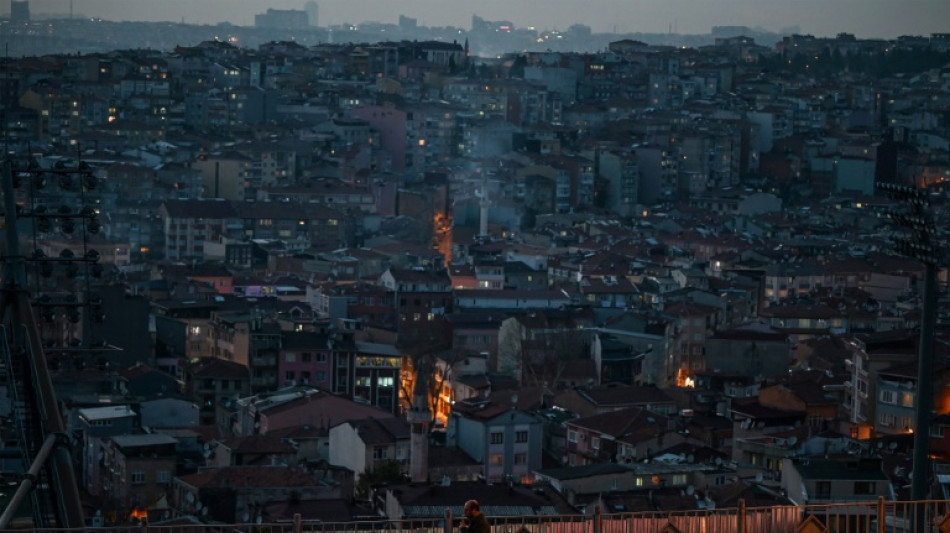
-
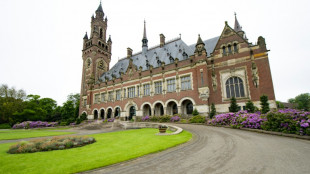 US official tells UN top court 'serious concerns' over UNRWA impartiality
US official tells UN top court 'serious concerns' over UNRWA impartiality
-
Jeep owner Stellantis suspends outlook over tariffs

-
 New Zealand, Phillippines sign troops deal in 'deteriorating' strategic environment
New Zealand, Phillippines sign troops deal in 'deteriorating' strategic environment
-
Aston Martin limits US car imports due to tariffs

-
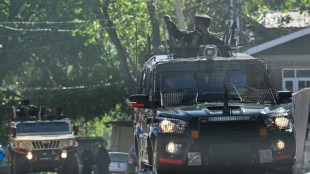 Pakistan says India planning strike as tensions soar over Kashmir
Pakistan says India planning strike as tensions soar over Kashmir
-
Australian triple-murder suspect allegedly cooked 'special' mushroom meal

-
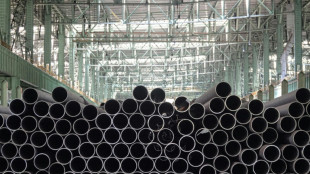 Most stock markets rise despite China data, eyes on US reports
Most stock markets rise despite China data, eyes on US reports
-
TotalEnergies profits drop as prices slide

-
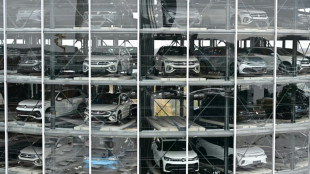 Volkswagen says tariffs will dampen business as profit plunges
Volkswagen says tariffs will dampen business as profit plunges
-
Jeep owner Stellantis suspends 2025 earnings forecast over tariffs

-
 China's Shenzhou-19 astronauts return to Earth
China's Shenzhou-19 astronauts return to Earth
-
French economy returns to thin growth in first quarter

-
 Ex-Premier League star Li Tie loses appeal in 20-year bribery sentence
Ex-Premier League star Li Tie loses appeal in 20-year bribery sentence
-
Belgium's green light for red light workers

-
 Haliburton leads comeback as Pacers advance, Celtics clinch
Haliburton leads comeback as Pacers advance, Celtics clinch
-
Rahm out to break 2025 win drought ahead of US PGA Championship

-
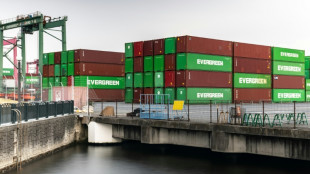 Japan tariff envoy departs for round two of US talks
Japan tariff envoy departs for round two of US talks
-
Djurgarden eyeing Chelsea upset in historic Conference League semi-final

-
 Haliburton leads comeback as Pacers advance, Pistons stay alive
Haliburton leads comeback as Pacers advance, Pistons stay alive
-
Bunker-cafe on Korean border paints image of peace
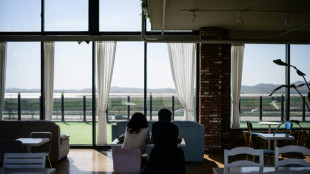
-
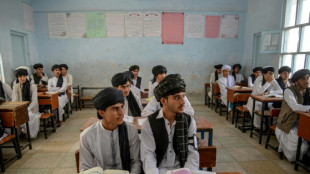 Tunics & turbans: Afghan students don Taliban-imposed uniforms
Tunics & turbans: Afghan students don Taliban-imposed uniforms
-
Asian markets struggle as trade war hits China factory activity
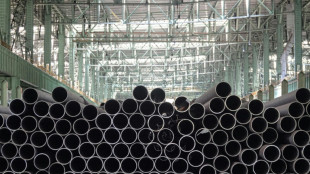
-
 Norwegian success story: Bodo/Glimt's historic run to a European semi-final
Norwegian success story: Bodo/Glimt's historic run to a European semi-final
-
Spurs attempt to grasp Europa League lifeline to save dismal season

-
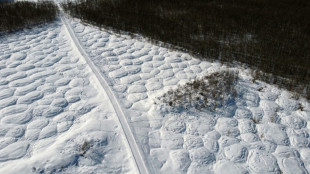 Thawing permafrost dots Siberia with rash of mounds
Thawing permafrost dots Siberia with rash of mounds
-
S. Korea prosecutors raid ex-president's house over shaman probe: Yonhap

-
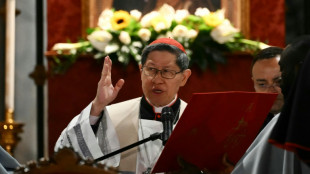 Filipino cardinal, the 'Asian Francis', is papal contender
Filipino cardinal, the 'Asian Francis', is papal contender
-
Samsung Electronics posts 22% jump in Q1 net profit

-
 Pietro Parolin, career diplomat leading race to be pope
Pietro Parolin, career diplomat leading race to be pope
-
Nuclear submarine deal lurks below surface of Australian election
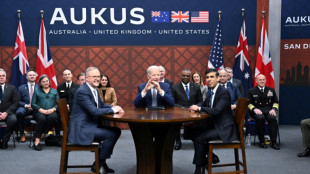
-
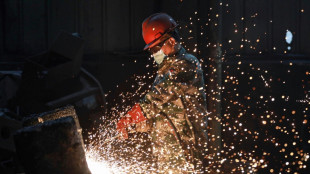 China's manufacturing shrinks in April as trade war bites
China's manufacturing shrinks in April as trade war bites
-
Financial markets may be the last guardrail on Trump
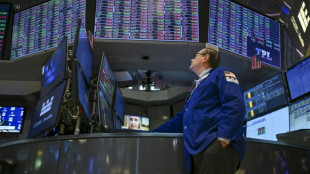
-
 Swedish journalist's trial opens in Turkey
Swedish journalist's trial opens in Turkey
-
Kiss says 'honour of a lifetime' to coach Wallabies at home World Cup

-
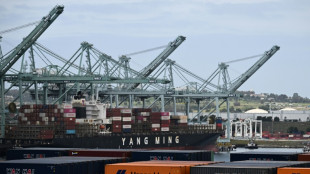 US growth figure expected to make for tough reading for Trump
US growth figure expected to make for tough reading for Trump
-
Opposition leader confirmed winner of Trinidad elections

-
 Snedeker, Ogilvy to skipper Presidents Cup teams: PGA Tour
Snedeker, Ogilvy to skipper Presidents Cup teams: PGA Tour
-
Win or bust in Europa League for Amorim's Man Utd

-
 Trump celebrates 100 days in office with campaign-style rally
Trump celebrates 100 days in office with campaign-style rally
-
GoodData Reports Record Q1 Growth, Sets Stage for AI Launch in Q2 2025

-
 Liberty Backs Business Owners Following 2025-26 Australian Federal Budget
Liberty Backs Business Owners Following 2025-26 Australian Federal Budget
-
Helium One Global Ltd Announces Jackson-27 Flow Test Results & Gas Analysis Update

-
 Argo Blockchain PLC Announces Financial Update and Listing Suspension Request
Argo Blockchain PLC Announces Financial Update and Listing Suspension Request
-
Guardian Metal Resources PLC Announces Tempiute Mine Project - Geological Update

-
 Agronomics Limited Announces BlueNalu Expands Partnership with Nomad Foods
Agronomics Limited Announces BlueNalu Expands Partnership with Nomad Foods
-
Helium One Global Ltd Announces Jackson-2 Spud at Galactica Project

-
 Global Industry Leaders to Address Critical Trade Changes at Licensing Expo 2025
Global Industry Leaders to Address Critical Trade Changes at Licensing Expo 2025
-
Top Cuban dissidents detained after court revokes parole
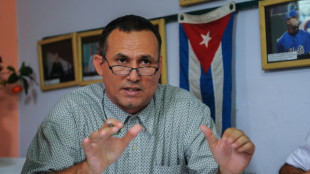
-
 Arteta urges Arsenal to deliver 'special' fightback against PSG
Arteta urges Arsenal to deliver 'special' fightback against PSG
-
Trump fires Kamala Harris's husband from Holocaust board


'No longer safe' from quakes: fear of 'Big One' grips Istanbul
The helmet-topped engineer drove his pointy instrument into the concrete to test whether Durmus Uygun's building will crumble when the feared big quake finally strikes Istanbul.
"I'm pretty confident but my children aren't convinced, so we're having this test done," said Uygun, who lives in one of the Turkish megalopolis's poorer and more densely packed neighbourhoods.
"If the result is good, we will live in peace. But who knows where we will be when the earthquake hits? We may be at the supermarket or at work -- that's what scares us."
In his fifties and wearing a black beret, Uygun is far from the only one living in fear in Istanbul.
Turkey's cultural and economic capital is home to up to 20 million people, many still haunted by memories of the last "Big One" that struck just east of the city in 1999. More than 17,000 people died, including 1,000 in Istanbul.
The city has grown substantially since then, becoming a magnet for people attracted by its booming economy -- and oblivious to the active fault line running along its southern edge.
That changed on February 6, when a 7.8-magnitude earthquake killed more than 48,000 in southeastern Turkey and nearly 6,000 over the border in Syria, leaving entire cities in ruins.
A state of collective psychosis has since gripped Istanbulites, who have requested more than 140,000 checks of the type being conducted on Uygun's apartment building.
- Disaster a 47-percent chance -
By the municipality's own admission, nearly 100,000 buildings will collapse or be seriously damaged in the event of a 7.5-magnitude quake.
Fifty teams of engineers have been roaming the city since last month's disaster, measuring the quality of concrete and the width of steel reinforcement bars.
If the risk to the building is deemed "very high", it could be condemned to demolition and occupants forced to move out.
Some of Istanbul's southern districts lie just 15 kilometres (nine miles) from the North Anatolian Fault, which is distinct from the equally active East Anatolian Fault on which last month's quake struck.
Seismologists have calculated a 47-percent chance of an earthquake with a magnitude above 7.3 hitting Istanbul within 30 years.
Two blocks from Uygun's building, hardware store owner Ali Nezir has started selling whistles to locals who fear getting trapped under tonnes of concrete.
"People are scared," said Nezir, whose small shop is on the ground floor of a 12-storey tower.
- Whistles and water bottles -
Some residents say they have started storing biscuits and water bottles at the foot of their beds in case the quake comes in the middle of the night, leaving them trapped.
Uygun has prepared some emergency bags for his family containing enough to survive on while waiting for help.
Ugur Erisoglu, an Istanbul wholesaler, offers earthquake survival bags for 200 lira ($10) containing torches, blankets, medical kits and neck braces.
"We used to sell 1,000 a month," Erisoglu said. "We have received 15,000 orders since the earthquake, including 8,000 from Istanbul."
The sudden reminder of the threat hanging over Turkey's main city is forcing some to seriously contemplate moving home.
"There is strong demand for northern districts of Istanbul, further from the fault line, and for individual houses," said Mehmet Erkek, the general manager of Zingat, a real estate listings platform.
Searches have also exploded for cities such as Edirne and Kirklareli, located in a less quake-prone region 200 kilometres northwest of Istanbul.
- 'Always on alert' -
Nil Akat, a clinical psychologist, says she has been receiving patients "who are making very concrete plans to move out of Istanbul".
"Many no longer feel safe at home. They are on high alert, always on alert. Out on the street, they pick out safer looking sidewalks in case a building should collapse."
Akat said she spoke to some colleagues who told her: "Some (of our patients) can no longer think rationally."
This fear can grip anyone, without distinction for age or social class, she said.
Cisel Aktimur, a young Istanbulite who enjoys a breathtaking view of the city from her 12th-floor apartment, had been thinking of leaving for some time.
Last month's disaster has made moving a "priority", she said.
"Even if nothing happens to my building, I probably wouldn't be able to bear what I see," she said.
F.Bennett--AMWN